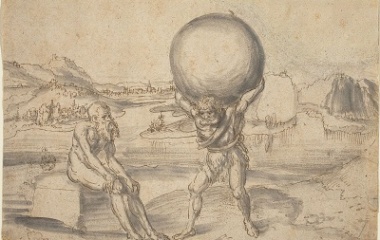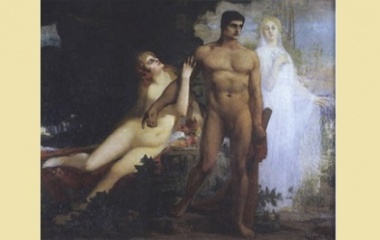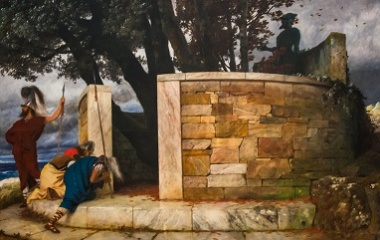- Pronunciation: HER-cue-leze
- Origin: Greek
- Role: Hero
- Parents: Zeus and Alcmene
- Children: Thersimachus, Creontidas, and Deicoon
- Symbol: Wooden Club
- Other Name: Heracles
Who Is Hercules?
Hercules earned a reputation in Greek mythology as a mortal hero. He was stronger than many of the gods and eventually become a god on his own. He was the crucial warrior earning victory over the giants while fighting for the Olympians. He was Zeus’ last mortal son, being born by a mortal woman named Alcmene.
Personality
Despite his strength, Hercules lacked intellectual strength. He was known for making foolish decisions and holding grudges. In one example, he threatened to shoot the sun with his bow and arrow because it was too hot. His emotions ran strong and he often found himself in trouble because of them. He had a strong appetite for gluttony, alcohol, and passionate nights spent with multitudes of women.
Reputation
In earlier recounts of Hercules, he was known for being foolish and prideful. This overshadowed his strength and battle tactics. But eventually, he became known as a hero, even with his negative attributes. He was eventually viewed and worshipped as a god.
Legends and Stories
Most of the myths regarding Hercules focus on his strength and interactions with other warriors and kings. There are more myths about Hercules than most Greek mythological characters but here are some of the most cherished.
The Birth of Hercules
Hercules was born to Zeus and Alcmena but his conception was full of deceit. Alcmena was married to Amphitryon, a Greek warrior. While the warrior was away at battle, Zeus took on the appearance of him and slept with his wife. Amphitryon returned the next night and made love to his wife, saying that he hadn’t been home the night before. Alcmena thought his memory was slipping so they went to a blind prophet who told them that it had been Zeus the first evening. He predicted that she would give birth to a hero.
Alcmena gave birth to twins. The first was Hercules, Zeus’ son, and the second was Iphicles, Amphitryon’s son. When Hera, Zeus’ wife, learned of the seduction, she was furious. Zeus had many affairs and Hera would always try to punish either the women or the children. She tried to kill Hercules by placing two poisonous snakes in his crib. But Hercules, even though he was an infant, strangled the snakes. Hera was unable to kill the boy but she caused many tribulations for him throughout his life.
The Twelve Labors of Hercules
One of the most well-known myths of Hercules speaks of the Twelve Labors, which were a series of difficult tasks given to the warrior by King Eurysteus. The first task required the hero to kill the Nemean Lion, a beast who terrorized the locals. No weapon had been able to kill the beast before so Hercules strangled him and wore his fur as a cloak.
Next, Hercules had to kill the Lernaean Hydra, a swamp creature with nine heads. One head was immortal and the others regenerated. Hercules cut off the first eight heads and cauterized the wounds so new heads couldn’t grow back. But because he couldn’t damage the final head, he buried the monster beneath a rock.
The third task required Hercules to capture a golden-horned deer called the Cerynean Hind. He hunted for the deer for a year but finally captured it.
The fourth task had Hercules seeking the Erymanthian Boar who lived near Mount Erymanthus. He forced the animal from hiding and chased it until it gave up from exhaustion.
Next, Hercules was asked to clean the Augean Stables in only a day. Herds of cattle called the stables their home and they had not been cleaned in years. The hero forced rivers to flow through the stables and accomplished the task.
The sixth labor required Hercules to scare away the Stymphalian Birds. They terrorized the locals with their claws and long beaks and were known to eat humans. Hercules shot the birds with his bow and arrow, forcing them to leave.
Next, Hercules was asked to capture the Cretan Bull and bring it to the king alive. Hercules asked the owner for permission and brought the animal, still alive, to Tiryns.
The eighth labor required Hercules to capture the Mares of Diomedes. The herd of horses ate human flesh and were owned by King Diomedes. Hercules killed the king and fed the body to the horses. He them tamed them and captured them.
For the ninth task, Hercules was asked to retrieve the girdle of the queen of the Amazons. The queen greeted the hero warmly but Hera convinced the Amazons he was there to capture the queen. Hercules had to fight off the Amazons and ended up killing the queen to take the girdle.
Next, Hercules was asked to capture a monster with three bodies called the Cattle of Geryon. After a long and dangerous journey, Hercules captured the monster and killed it.
Next, Hercules was asked to bring the golden apples of the nymphs back to the king. He killed a dragon that stood guard at the apple tree and picked enough to bring back.
Finally, Hercules was given his twelfth labor. He had to go to the Underworld and capture Hades’ three-headed dog named Cerberus. He drugged the dog and carried him back to the king.
Family
Hercules was the son of Zeus and Alcmene. He had two wives. The first was Deianeira. Together, they had three children. But Hera killed Deianeira and her children, Aeson, Klonus, and Ilea, with a fireball.
Hercules was then married to Serena but she was killed by Strive. He was then engaged to Lucretiana, even though he never planned on marrying her. She ended the engagement as she learned more about Hercules’ dangerous lifestyle.
He had three sons with Megara, named Thersimachus, Creontidas, and Deicoon.
Appearance
Hercules was a very handsome man. He was muscular, with the energy of a young man but the features of an adult. He is usually shown with a beard but not always.
Symbology
Hercules’ symbols include his wooden club and a lion skin. His muscles are also often considered a symbol of his strength and masculinity.










